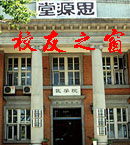

 |
 |
|---|
| |
|
|---|
主者,国之心也 主者,国之心也,心治则百节皆安,心扰即百节皆乱。--《淮南子》【註1】
A ruler is the heart of a nation. When the heart is free of ailments all parts of the body will be functioning peacefully ; if the heart is sick, the whole body will be in chaos. -- 《Huai Nan Zi》
子路问君子。子曰:“修己以敬。”曰:“如斯而已乎?”曰:“修己以安人。”曰:“如斯而已乎?”曰:“修己以安百姓。修己以安百姓,尧舜其犹病诸。 -- 《论语》【註2】
Zilu asked Confucius a how to be a man of noble character? Confucius answered, "A man who cultivates respectfulness in his speech and actions and renders peace and happiness to others can be called a noble man." Zilu asked "Is that all?" Confucius replied, "By cultivating himself he will be able to bring peace and happiness to other people." Zilu asked again"Is that all??” Confucius answered, " Cultivating himself to bring peace and happiness to common people. It is something that even Emperors Yao and Shun found not easy to accomplish."-- 《The Analect》
三代之興, 無不抑損情欲; 三季之衰, 無不肆其侈靡。-- 《晉書上》【註3】The three dynasties - Xia, Shang, and Zhou - all enjoyed the reigning times of prosperity just because the rulers exercised a strict restraint over their lust and greediness. The consequential downfalls of the three dynasties were all due to unrestrained luxury and extravagance. -- 《Jinshu Vol 1》 【註1】《淮南子》为西汉淮南王刘安及其门客所著。本名《鸿烈》,鸿,大也;烈,明也;以为大明道之言也。内容广博,对政治、哲理、天文、地理、自然、养生、军事都有所论述,融合先秦诸子的思想,而以道家老庄为主,采纳儒家和阴阳家的观点,修正先秦道家的无为。 【註2】《论语》是春秋时期思想家、教育家孔子的弟子及再传弟子记录孔子及其弟子言行而编成的语录文集,成书于战国前期。 全书共20篇492章,以语录体为主,叙事体为辅,较为集中地体现了孔子及儒家学派的政治主张、伦理思想、道德观念、教育原则等。 【註3】《晉書》,中國的二十四史之一,于唐朝貞觀二十二年(公元648年)寫成。唐朝名相房玄齡等人合著,作者共二十一人。記載的歷史上起三國時期司馬懿早年,下至東晉恭帝元熙二年(公元420年)劉裕廢晉帝自立,以宋代晉。該書同時還以「載記」形式,記述了十六國政權的狀況。原有敘例、目錄各一卷,帝紀十卷,志二十卷,列傳七十卷,載記三十卷,共一百三十二卷。後來敘例、目錄失傳,今存一百三十卷。 (原载《海外南开人》122期,October 28, 2017出版)
|
|
|---|
| Contact 联系 | Last Revised
05/11/2025
| |